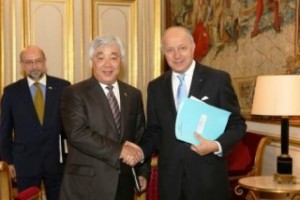 PARIS – Kazakhstan and France are working to expand their relations across the board as the two countries prepare for the French president’s visit to Astana before the end of the year, Kazakhstan’s Foreign Ministry announced following the visit here by its top diplomat.
PARIS – Kazakhstan and France are working to expand their relations across the board as the two countries prepare for the French president’s visit to Astana before the end of the year, Kazakhstan’s Foreign Ministry announced following the visit here by its top diplomat.
Kazakh Foreign Minister Erlan Idrissov met with his French counterpart, Loran Fabius, as well as the French president’s counsellor on multilateral cooperation, Jacques Audibert, on June 10 to discuss expanding bilateral political and economic ties, including organising President François Hollande’s visit to Kazakhstan at the invitation of Kazakh President Nursultan Nazarbayev at the end of 2014.
President François Mitterrand visited Almaty in 1993, while President Nicolas Sarkozy visited Astana in 2009. President Nazarbayev has visited France 10 times overall, and it was during one such visit in 2008 that the countries signed an agreement on their strategic partnership.
According to the Kazakh Foreign Ministry, Idrissov and Fabius noted that the upcoming visit should mark the achievement of the new mutually-beneficial agreements, which will expand the fields of joint activities between the nations, primarily in the economic sector.
Trade and economic cooperation is one of the main components of the Kazakh-French strategic partnership. In this context, the two ministers marked the successful work of the intergovernmental commission on economiccooperation and the business council that facilitates the discussion and resolution of economic issues.
“By the end of 2013, France was fifth among the leading trading partners, with a volume of trade that exceeded $6 billion. In terms of direct investments into Kazakhstan’s economy, France holds fourth place. For the years of cooperation, this figure amounts to more than $10 billion,” Idrissov stated.
The two ministers expressed their intention to further develop cooperation in areas such as aerospace, manufacturing Eurocopter helicopters, nuclear energy and mechanical engineering.
The ministers also discussed the possibility of establishing direct flights between Astana and Paris, which would provide an important impetus to Kazakh-French cooperation as well as to developing tourism, enhancing business contacts and promoting investment.
Idrissov noted that Kazakhstan attaches great importance to cooperation in education.
“Joint research projects and studies are being successfully developed between the universities of our countries. We welcome the establishment of Kazakhstan-Sorbonne University in Almaty and the opening of French schools,” he said.
Turning to multilateral cooperation, the two ministers discussed the new agreement on expanded partnership and cooperation between Kazakhstan and the European Union (EU) that is being negotiated now to replace the outdated one from the late 1990s.
“A new agreement will give an opportunity to consolidate the privileged nature of our partnership, in which we have to take into account our mutual interests in equal proportions,” Idrissov stated. He also expressed his hope that the parties will be able to finalise the text of the document during the next round of negotiations in order to sign it in October in Brussels.
The Kazakh foreign minister also addressed mutual liberalisation of the visa regime, expressing hope for the support of the French side in this matter.
“It is necessary to emphasise the increase in mutual trips by our citizens. Every year, more than 100,000 Kazakh citizens visit European countries. In this regard, the current visa regime between Kazakhstan and the EU does not correspond to the existing realities and goals of the development of political and economic dialogue,” he said. France is a signatory to the Schengen agreement, which established a pan-European visa regime. On June 12, Kazakhstan announced the introduction of a visa-free regime for short-term visits by citizens of ten countries, including France.
During his meeting with Fabius at the Quai d’Orsay, Idrissov stressed that Kazakhstan considers France an important and reliable partner in international organisations.
“We express our special gratitude to France for the positive attitude toward our request for status as a nonpermanent member of the UN Security Council for 2017-2018,” Idrissov said.
Noting the significant scientific and technological level of development and implementation of green technologies in France, Idrissovurged French companies to take an active part in the preparations for EXPO 2017.
In Paris, Idrissov also met with Yves-LouisDarricarrère, co-chairman of the Kazakh-French Business Council and president of the energy company Total Upstream, and Luc Oursel, president and CEO of AREVA.
